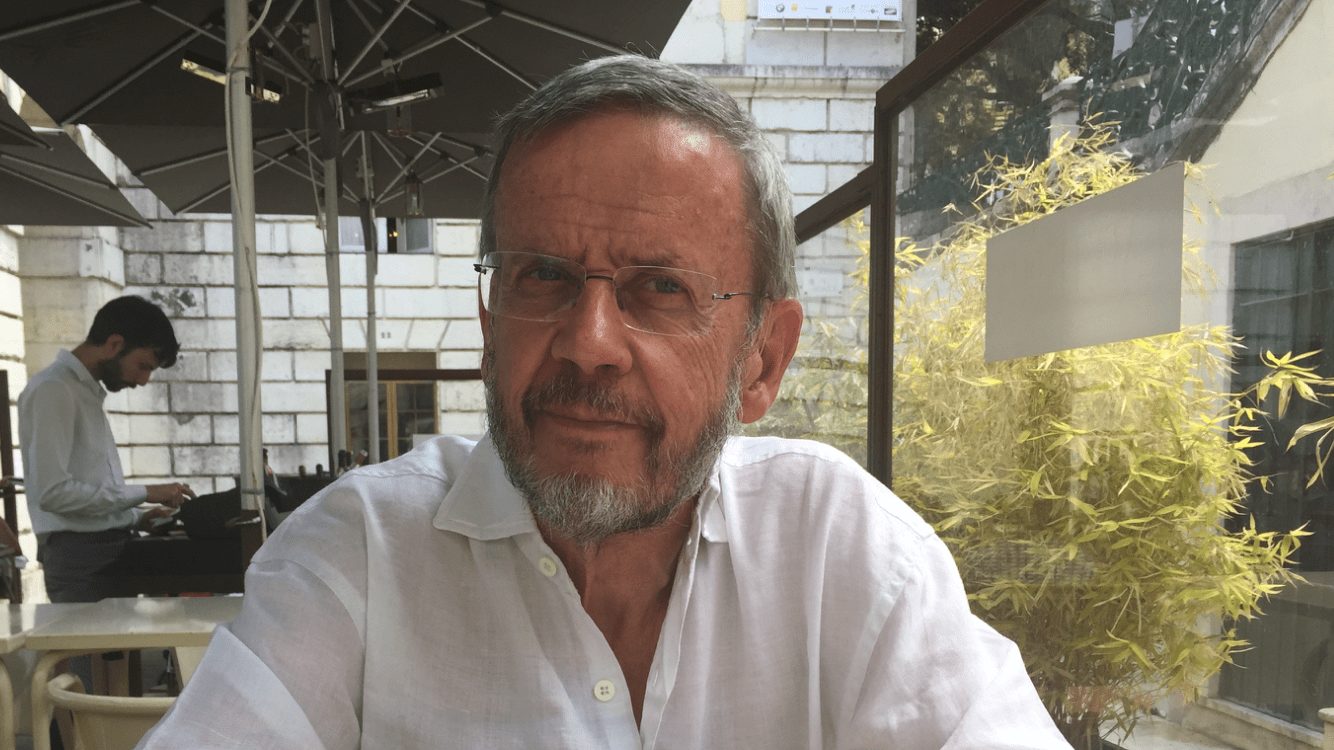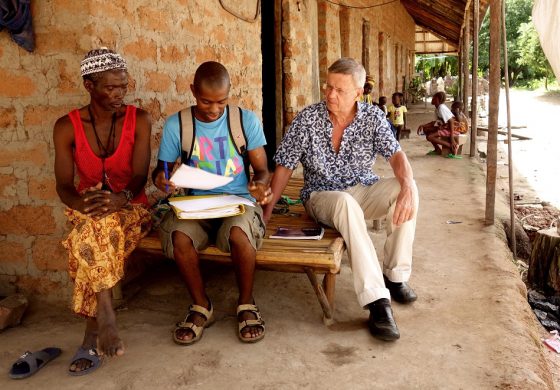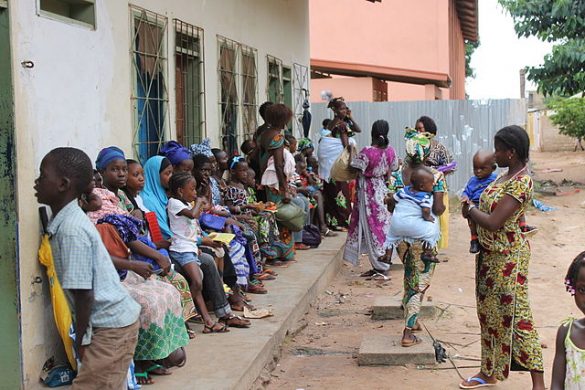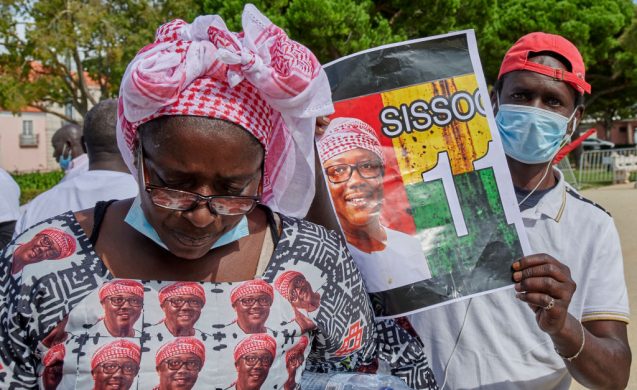
Peter Aaby
Foto: Kirsten Bohl
Peter Aaby er antropolog, men blev dr. med. på sin forskning – og han skabte ikke bare store videnskabelige landvindinger, men har også reddet mange, ikke mindst børneliv.
Det er således ham, Sidsel Gazan har brugt som inspiration til bogen "Svalens graf"
Om vacciners mange virkninger
Det er almen viden, at vacciner beskytter mod bestemte sygdomme som polio, kobber, mæslinger. Men de beskytter mod mere end det:
Mæslingevaccinationer i lavindkomstlande har f.eks fået dødelighedsraten til at falde med mindst 50 pct. – det er meget mere end man kan tilskrive beskyttelsen mod at få mæslinger.
Det er nu 72-årige Peter Aaby, der har stået centralt i udviklingen af den nye viden.
Peter Aaby har en medicinsk doktorgrad, men er ikke læge. Han er antropolog, og det var i arbejdet i lavindkomstlande i 70’erne og 80’erne, han blev optaget af vaccinationsproblematikken.
Den almindelige opfattelse var da, at effekterne af vacciner er de samme for piger som for drenge, og at der er risiko for bivirkninger, men de er sjældne.
I et stort vaccinationsprojekt – med en ny højdosis mæslingevaccine – opdagede man to gange højere dødelighed for piger end den gamle mæslingevaccine, mens den ikke gjorde nogen forskel for drenge.
Disse observationer blev bekræftet i randomiserede studier i flere afrikanske lande.
(Red.: Et randomiseret klinisk forsøg er en undersøgelse af effekten af en behandling. Forsøget er kendetegnet ved, at patienter fordeles tilfældigt til enten at modtage en eksperimentel behandling eller en kontrolbehandling.)
Selv om disse observationer totalt modsagde væsentlige antagelser i det aktuelle vaccinationsprogram, var der ikke noget officielt forsøg på at forstå, hvordan dette var muligt.
Været virksom i Guinea-Bissau siden 1978
Forsøget på at forstå disse modsætninger er blevet ledestjernen for Peter Aabys Bandim-projekt både i Guinea-Bissau i Vestaffrika og på Statens Serum Institut i København, hvor han fortsat virker. Læs mere her
Mere om den lille fhv. portugisiske koloni mellem Senegal og Guinea på Wikipedia
I dag er Peter Aaby adjungeret professor på SDU og æresdoktor ved Universitetet i Lissabon, og han og hans hold står nu over for en stor udfordring.
For når sygdomme udryddes, vil man almindeligvis stoppe vaccinationen, men er det nu klogt med den nye viden om det, forskerne kalder vaccinationernes ”uspecifikke effekter”? Det mener han ikke:
Han og hans hold har vist i både Guinea-Bissau og Danmark, at personer, der er koppevaccinerede, har en langt bedre langtidsoverlevelse end ikke vaccinerede.
Tankevækkende ord fra en prisvinder
"Den problematik fortjener langt mere fokus nu, fordi verden er ved at udrydde polio, måske allerede i år, og mæslinger inden for de næste 10 år", siger Peter Aaby i en presseudtalelse og fortsætter:
"Hvis vi fjerner den levende polio-vaccine – som planlagt i 2020 – og mæslingevaccinen, vil det kunne komme til at have meget negative effekter for sygeligheden i lavindkomstlande, fordi vi dermed mangler de gavnlige uspecifikke effekter af disse vacciner".
Peter Aabys allerførste videnskabelige artikel blev publiceret så prominent som i ”The Lancet” – og i alt har han været med til at skrive 582 artikler, ofte som førsteforfatter, men også tit som mentor for yngre forskningsmedarbejdere.
Gennem årene har han været mentor ved 11 doktordisputatser, vejleder på 36 ph.d-afdelinger og har for øjeblikket ni ph.d-afhandlinger i gang.
Hans forskning har haft betydelige resultater, ikke mindst i Guinea-Bissau. Da han startede arbejdet dér, døde halvdelen af alle indbyggere indenfor de første fem leveår. Nu overlever mere end 90 pct. de første leveår.
Peter Aaby har nået så vigtige resultater, at han i 2009 fik Udenrigsministeriets udmærkelse som den 5. mest betydningsfulde dansker, når det gælder om at kæmpe mod global fattigdom.
Prismodtageren kontaktes på
tlf. 25 88 39 64 og e-mail: p.aaby@bandim.org
Positions and Employment
1968-1991 Institute of Anthropology, University of Copenhagen
1978- Field work in Guinea Bissau.
- Associated with SAREC, Sweden.
1987-1991 Associated with Danish Church Aid
1991- Statens Serum Institut, Amager Kbn
1995-2001 Research.professor, Danida/SSVF
2002-2014 Novo Nordisk Foundation research professorship grant
Other Experience and Professional Memberships
1989-1991 TDR steering committee for Social and Economic Research
1996- Professorship evaluation committees, Copenhagen, Stockholm
1990- More than 200 invited lectures mostly outside Denmark
Honors
2000 Novo Nordisk prize for ”Ground-breaking epidemiological research especially with regard to vaccinations against measles infection”
2009 Danish Ministry of Foreign Affairs: 5th most important Dane for fighting global poverty
2009 + 2011+ 2014:
Nominated as one of 10 best Danish research result of the year; on two occasions 2nd prize
2010 Step 2 for ERC, Advanced Grant, not funded
2012-2016 Adjunct Professor, University of Southern Danish (SDU)
2012-2017 Co-organiser of Research Center for vitamins and vaccines (CVIVA), center of excellence sponsored by the Danish National Research Foundation (Centre leader: Christine S Benn)
2015 Doctor Honoris Causa, Universidade Nova de Lisboa
Research training
Experience in research training based on work in West Africa: 11 researchers have obtained a doctoral degree, 36 have obtained PhD degree, and 9 PhD projects are on-going.
The first PhD from Guinea-Bissau, Amabelia Rodrigues became the first director of the National Institute of Health, Guinea-Bissau. Kåre Mølbak became the state epidemiologist of Denmark.
Many previous students are professors or senior registrars. Christine S Benn has become the first Danish physician to receive an ERC starting grant and has received a Danish National Research Foundation Centre of Excellence grant. Many previous students are professors or senior registrars.
Scientific Focus
Since 1978 Prof. Aaby has built a large health and demographic surveillance system (HDSS) in Guinea-Bissau. In 1978, under-5 child mortality was 500/1000. Contrary to all expectations, the high measles case fatality (25%) was not due to malnutrition but to the intensity of exposure as secondary case within the family.
Intensity of exposure was subsequently shown to explain severity in many childhood infections including pertussis, chickenpox, polio and RSV. The project was the first to introduce measles vaccine (MV) in Bissau in 1979. The MV campaign reduced overall child mortality to one-third, an effect not explained by prevention of measles infection. This led to a series of discoveries contradicting the specific-solution paradigm.
Vaccines affect general resistance/susceptibility to unrelated infections and these non-specific effects are far more important for child survival than the specific preventive effects:
Live vaccines, including measles vaccine, BCG, OPV and smallpox vaccination, have major beneficial non-specific effects, whereas non-live vaccines, including DTP, IPV, HBV, Pentavalent and RTS,S malaria vaccine have negative for female survival.
A new paradigm emphasising that the immune system is a learning entity which can be boosted or misdirected is needed. Pursuing this paradigm can lead to major reductions in child mortality in low-income countries and to health care cost-savings in rich countries.
Peer reviewed publications
Since Mr. Aaby started in epidemiology, he has published 582 papers. The 10 most important publications in the field of NSEs in the last 10 years are indicated below:
Selected recent publications:
- Benn CS, ..Aaby P. Randomised trial of vitamin A supplementation and BCG vaccination at birth to low-birth-weight children. BMJ 2010; 340:c1101.
- Aaby P, et al. Non-specific effects of standard measles vaccine at 4.5 and 9 months of age on childhood mortality: Randomised controlled trial. BMJ 2010;341:c6495
- Aaby P, et al. Randomized trial of BCG vaccination at birth to low-birth-weight children: beneficial nonspecific effects in the neonatal period? JID 2011;204:245-52
- Aaby P, et al. Testing the hypothesis that diphtheria-tetanus-pertussis vaccine has negative non-specific and sex-differential effects on child survival in high-mortality countries. BMJ Open 2012;2:e000707.
- Benn CS, Netea MG, Selin LK, Aaby P. A small jab – a big effect: nonspecific immunomodulation by vaccines. Trends Immunol 2013;34:431-9
- Sørup S, Benn CS, Poulsen A, Krause T, Aaby P, Ravn H. Live vaccine against measles, mumps, and rubella and the risk of hospital admissions for nontargeted infections. JAMA 2014;311:826-35
- Aaby P, et al. Measles vaccination in the presence or absence of maternal measles antibody: impact on child survival. CID 2014;59:484-92
- Aaby P, Kollmann T, Benn CS. Non-specific effects of neonatal and infant vaccination – public health, immunological, and conceptual challenges. Nature Immunology 2014;15:895-99
- Benn CS, Fisker AB, Whittle HC, Aaby P Revaccination with live attenuated vaccines confers additional beneficial non-specific effects on overall survival. A review. EBioMedicine (in press)
- Aaby P, Ravn H, Benn CS. The WHO review of the possible non-specific effects of diphtheria-tetanus-pertussis vaccine. PIDJ (in press)
Research Support
- Research professorship grant: Novo Nordisk Foundation 2011-2014; 660,000 euro
- Monitoring and assessing the impact of vaccinations and other childhood interventions for both boys and girls: Danida 2010-2016; 1,320,000 euro
- Optimising the impact and cost-effectiveness of existing child health intervention programmes for vaccines and micronutrients in low-income countries: EU FP7 2011-2016; 2,999,970 euro







